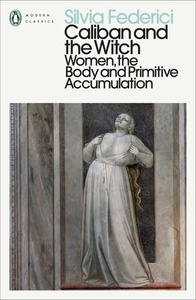Take a photo of a barcode or cover
reflective
medium-paced
Although this book is somewhat informative and addresses a very dark and revolting period in history, marked by it's misogyny, racism, ignorance and cruelty, I only give it 3 stars. It left me scratching my head and confused (there are other reviews here on Storygraph with links that explain these points deeper, if you want to check it out):
- the points made are not very clear sometimes, things are mentioned but the reasoning goes nowhere or doesn't make sense;
- historical "facts" are inaccurate or not cited, for example the number of women killed during that period is exagerated, the fact that men were also persecuted and actual important works about the witch hunt that were ignored to make a false point that "there is not enough study of this topic and I'm the one that's gonna talk about this" (this brings me to another point, more personal and emotional: I feel the author was being manipulative and arrogant);
- she lies: some drawings are manipulated or have important parts that completely change the interpretation of them cut out for the author to make her point: when you see the original complete piece, it's about something completely different from what is shown on the book;
- the connection between situations or events feels "forced" (correlation associated with causality when it's proven not to be the case, for example: associating the philosophical rationalism and misogyny and the witch hunt, when the rationalism denied the existence of magic and witches);
- the weight of cristian beliefs to the witch hunt doesn't have much importance, to the author is seen as just an excuse for something that's political and economical: in my view, both political and religious reasons contributed to the witch hunt;
- in moral terms, things that were important for the evolution of humanity are low key considered "bad" and even "sexist" (for example, anatomy studies) and things that are not acceptable are dismissed as lies or considered to not be as "bad" (for exemple, killing ou abandoning children or human sacrifices made by indigenous people), the author is not clear about her position about what is considered basic human rights and what is acceptable, she just mentions things, but again, it goes nowhere.
At least, this made me think critically of certain aspects and search for the accuracy of the information, so I learned a lot from actually questioning it.
- the points made are not very clear sometimes, things are mentioned but the reasoning goes nowhere or doesn't make sense;
- historical "facts" are inaccurate or not cited, for example the number of women killed during that period is exagerated, the fact that men were also persecuted and actual important works about the witch hunt that were ignored to make a false point that "there is not enough study of this topic and I'm the one that's gonna talk about this" (this brings me to another point, more personal and emotional: I feel the author was being manipulative and arrogant);
- she lies: some drawings are manipulated or have important parts that completely change the interpretation of them cut out for the author to make her point: when you see the original complete piece, it's about something completely different from what is shown on the book;
- the connection between situations or events feels "forced" (correlation associated with causality when it's proven not to be the case, for example: associating the philosophical rationalism and misogyny and the witch hunt, when the rationalism denied the existence of magic and witches);
- the weight of cristian beliefs to the witch hunt doesn't have much importance, to the author is seen as just an excuse for something that's political and economical: in my view, both political and religious reasons contributed to the witch hunt;
- in moral terms, things that were important for the evolution of humanity are low key considered "bad" and even "sexist" (for example, anatomy studies) and things that are not acceptable are dismissed as lies or considered to not be as "bad" (for exemple, killing ou abandoning children or human sacrifices made by indigenous people), the author is not clear about her position about what is considered basic human rights and what is acceptable, she just mentions things, but again, it goes nowhere.
At least, this made me think critically of certain aspects and search for the accuracy of the information, so I learned a lot from actually questioning it.
A dense read, a lot to digest, but worldview transforming, and excellent fodder for my mediaeval and early modern Europe obsession.
Como explicar lo que este libro despierta. Terminar de leerlo es como ver un puzzle completo. Es cierto, que como en los puzzles,cuesta montar el marco y organizar las piezas. Llegado el capítulo 4 y, sobre todo, el capítulo 5 (final) todo te encaja. Federici quiere abarcar mucho, tanto en tiempo como en temas, quizás es un poco caótica y poco concreta. Pero lo perdonamos por que no es historiadora. Ella es filosófa y su tarea es hacerse preguntas y dar respuestas a planteamientos de por qué. Y Federici hila todo muy bien para concluir que mantener un sistema capitalista hace que siempre halla colectivos que tienen que soportar la peor parte. En el caso que nos ocupa, son las mujeres las que han ido perdido poder para que el sistema capitalista funcione. Da igual la ideología, da igual la religión, da igual la clase social,... se ha asumido que para que el sistema funcione medianamente las mujeres tienen que tener menos derechos, tienen que tener menos opciones para hacer colectividad.
Leer a Federici es un gusto, pero hacerlo en compañía es mucho mejor por que eso es lo que ella pretende conseguir, que tengamos comunidades donde compartir.
Leer a Federici es un gusto, pero hacerlo en compañía es mucho mejor por que eso es lo que ella pretende conseguir, que tengamos comunidades donde compartir.
This is a remarkable deep dive into the history of the intersection of sexism, capitalism, land privatization, witch hunts, the mechanization of and control over the body of the proletariat in service to the bourgeoisie, and colonialism.
It was incredibly well cited with an extensive bibliography and reads a lot like a dense academic paper, but is surprisingly emotional and upsetting to read despite that due to the subject matter. It took awhile for me to read as I had to limit the amount of pages I could sit down and consume at once as it is difficult to process both intellectually and emotionally, but also well worth the effort.
I really wish I had known of this book and the overall research it stems from a lot sooner-it would have been really helpful during my dissertation preparation and study, and I feel like it expanded my knowledge and understanding of feminist history. I will definitely be keeping it on my bookshelf as a resource for future academic papers I may try to write; the bibliography alone is a fantastic resource.
Read for Bookclub: Folkways Reading Circle
It was incredibly well cited with an extensive bibliography and reads a lot like a dense academic paper, but is surprisingly emotional and upsetting to read despite that due to the subject matter. It took awhile for me to read as I had to limit the amount of pages I could sit down and consume at once as it is difficult to process both intellectually and emotionally, but also well worth the effort.
I really wish I had known of this book and the overall research it stems from a lot sooner-it would have been really helpful during my dissertation preparation and study, and I feel like it expanded my knowledge and understanding of feminist history. I will definitely be keeping it on my bookshelf as a resource for future academic papers I may try to write; the bibliography alone is a fantastic resource.
Read for Bookclub: Folkways Reading Circle
challenging
informative
reflective
medium-paced
fast-paced
informative
slow-paced
informative
inspiring
reflective
medium-paced
Though it took me months to get through, this is a gripping and eye-opening read.
In short, it extends Marx's concept of 'primitive accumulation' to the accumulation of differences between the sexes which, rather than socially inherent, were instilled through a social and political campaign: the witch-hunt. In a manner both physically and metaphorically similar to the Enclosures, women's bodies were 'enclosed upon' and made literal factories for capitalism in Europe and the Americas. The last chapter also provides how this process continues to undergird colonization and expropriation around the world via global capitalism.
Tons of history I'd never been exposed to before, unique stats like medieval crime rates and measures of inflation, and more than all useful analysis for thinking about our world today. Highly recommend.
In short, it extends Marx's concept of 'primitive accumulation' to the accumulation of differences between the sexes which, rather than socially inherent, were instilled through a social and political campaign: the witch-hunt. In a manner both physically and metaphorically similar to the Enclosures, women's bodies were 'enclosed upon' and made literal factories for capitalism in Europe and the Americas. The last chapter also provides how this process continues to undergird colonization and expropriation around the world via global capitalism.
Tons of history I'd never been exposed to before, unique stats like medieval crime rates and measures of inflation, and more than all useful analysis for thinking about our world today. Highly recommend.
"... witch-hunting was a deliberate strategy used by the authorities to instill terror, destroy collective resistance, silence entire communities, and turn their members against each other. It was also a strategy of enclosure which, depending on the context, could be enclosure of land, bodies or social relations. Above all, as in Europe, witch-hunting was a means of dehumanization and as such the paradigmatic form of repression, serving to justify enslavement and genocide.





